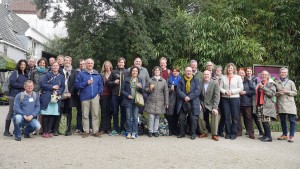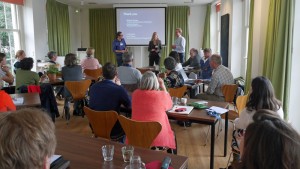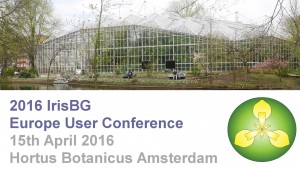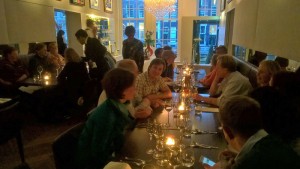Having come back from the Netherlands on Saturday, now several days later, I still feel the community buzz tingling whilst writing this article. Hortus Botanicus Amsterdam was a fantastic venue and our host, Curator Reinout Havinga and Director Taeke Kuipers made sure that the 30 delegates felt truly welcome to their wonderful garden. 
A well planned conference is essential for a successful experience. However, what made this year’s conference extra enjoyable was the diversity and quality of the presentations. Several presenters demonstrated that what might seem a straightforward approach for one garden is an inspiration to the rest of the community. This is an important lesson to bring to next year’s conference. Many thanks again to all the presenters for their hard work and for making this conference a great experience for everyone.
Our thanks also goes to all the delegates for actively participating in the discussions and hats off to the Norwegian delegation for deciding to organize their annual meeting in the Netherlands together with the Dutch gardens on Thursday. In addition, I would like to express our gratitude to all the delegates who travelled from Israel, Sweden, the UK and Germany.
I already look forward to next year’s conference.
Havard Ostgaard
* December 2019: This post was originally published under the title “European IrisBG User Conference…”. After the collaboration on the IrisBG software package ended on December 6th 2019, Botanical Software changed the name of its products and services to Floria. To avoid confusion about Botanical Software’s current involvement with IrisBG, we felt we needed to change the title of this post. The conference covers many generic topics about collection management and record keeping. We have for this reason decided to keep this material available as a useful resource. Strongly committed to our collaboration with the community, we will continue to organize conferences, workshops and other events.
Conference Programme Summary
The day started at 08:00 with an early bird session in which Havard Ostgaard and Øyvind Rustan introduced the basics of IrisBG. This session was very useful to those either new to IrisBG or involved at a less hands-on level.
At 10:00 Taeke Kuipers, director of Hortus Botanicus Amsterdam, officially opened the congress and welcomed the delegates. Havard Ostgaard and Reinout Havinga proceeded with more details about the programme.
Havard kicked off the morning session by expanding on his ideas about inclusive collections management and why it is a good idea. Anne-Catharine Scheen (Stavanger BG) talked about her garden’s cooperation model, where the division of tasks between the two people involved in collection management is managed by the informal agreement inspired by the Norwegian saying ‘freedom by responsibility’. Christopher Weddell (English Heritage), responsible for dozens of people working in 22 collections, needs a more formalised approach to cooperation and talked about training programmes connected to access levels.
After coffee, Reinout talked about how barcodes were successfully developed and implemented, changing stocktaking pathways in Amsterdam. Anneleen Kool (Oslo BG) literally explored the limits of IrisBG demonstrating how data is passed through external spreadsheets to reach new dimensions when using tasks. Ralf Omlor (Mainz BG) unfolded a record keeping procedure that supports the planning and maintenance of his systematic beds, which ran into the same limitations as experienced by Anneleen.
In the afternoon session, one of the three speakers could not make it to the conference, so Cees van Dam (Historic Garden Aalsmeer) got the ball rolling on putting your data to work. He showed us how he uses custom attributes on a taxonomic level to plan propagation. Following this approach of detailed documentation, Cees is able to safeguard and utilise horticultural knowledge today and for the future. Tami Zigler (Ramat Hanadiv) talked about the multi-lingual and Hebrew support in IrisBG and Garden Explorer which is required for institutes that operate in strict multilingual environments.
After the tea break, Heide Lie Andersen (Bergen BG) spoke about the challenges of making maps with a high level of detail for their rock garden. After this Havard continued with explaining how IrisBG integrates with ArcGIS for maps. Next on the agenda was the integration with the Digital Asset Management System for managing high resolution photos with IrisBG.
Reinout Havinga
Curator, Hortus Botanicus Amsterdam
Video recordings
Presentation slides
- Morning Training
- Introduction to IrisBG. Havard Ostgaard, IrisBG
- Working together
- Inclusive Collection Management. Havard Ostgaard, IrisBG
- Freedom by responsibility. Anne-Cathrine Scheen, Stavanger botanic garden
- 19 collections and counting: the English Heritage plant records team. Christopher Weddell, English Heritage
- Efficiency
- Using barcodes. Reinout Havinga, Hortus Botanicus Amsterdam
- Knowing what you don’t have: using IrisBG for inventories and wish lists. Anneleen Kool, Natural History Museum, University of Oslo
- The systematic garden: filling in gaps. Ralf Omlor, Botanic Garden, University of Mainz
- The proof of the pudding … is in the eating
- Knowledge sharing in a multilingual environment. Tami Zigler, Ramat Hanadiv
- Planning propagation (no slides). Cees van Dam, Historical Garden Aalsmeer
- Maps and new features
- Using ArcGIS maps in Iris to manage an alpine garden. Heidi Lie Andersen, Arboretum and Botanical Gardens, University of Bergen
- ArcGIS IrisBG Sync. Havard Ostgaard, IrisBG
- Image Handling Strategy + IrisBG Excel Add in. Havard Ostgaard, IrisBG


